湖南省怀化市会同三中八年级英语上册《Unit 5 Can you come to my party》教案2 人教新目标版
八年级英语上册 Unit5 Can you come to my party教案 人教新目标版
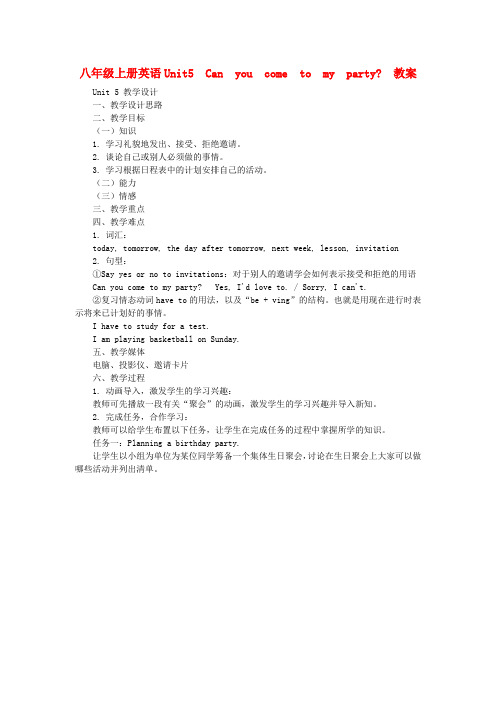
八年级上册英语Unit5 Can you come to my party? 教案Unit 5 教学设计一、教学设计思路二、教学目标(一)知识1. 学习礼貌地发出、接受、拒绝邀请。
2. 谈论自己或别人必须做的事情。
3. 学习根据日程表中的计划安排自己的活动。
(二)能力(三)情感三、教学重点四、教学难点1. 词汇:today, tomorrow, the day after tomorrow, next week, lesson, invitation2. 句型:①Say yes or no to invitations:对于别人的邀请学会如何表示接受和拒绝的用语Can you come to my party? Yes, I'd love to. / Sorry, I can't.②复习情态动词have to的用法,以及“be + ving”的结构。
也就是用现在进行时表示将来已计划好的事情。
I have to study for a test.I am playing basketball on Sunday.五、教学媒体电脑、投影仪、邀请卡片六、教学过程1. 动画导入,激发学生的学习兴趣:教师可先播放一段有关“聚会”的动画,激发学生的学习兴趣并导入新知。
2. 完成任务,合作学习:教师可以给学生布置以下任务,让学生在完成任务的过程中掌握所学的知识。
任务一:Planning a birthday party.让学生以小组为单位为某位同学筹备一个集体生日聚会,讨论在生日聚会上大家可以做哪些活动并列出清单。
八年级英语上册unit_Can_you_come_to_my_party
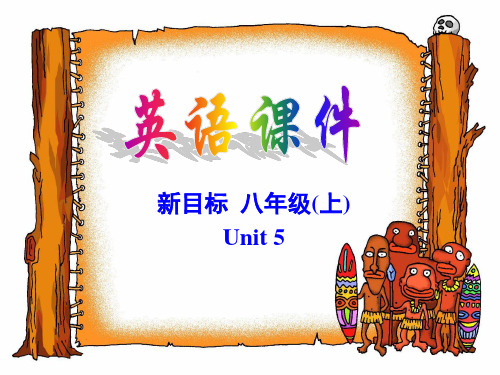
A: Can you come to my party? B: I’m sorry, I can’t. I….
( I’d love to, but I….)
study for a test
go to the doctor
I have to have a piano lesson.
I have to study for a test.
句并作肯定回答)
—C__a_n_ his brothers_w_i_m_? —Yes, he _ca_n__. 2. She can go to the movies. (改为否定句)
Shec_a_n_’_t go to e movies.
3. I have to help my grandparents. (改为 一般疑问句并作肯定回答)
1c GROUPWORK
A: Can you come to my party on Wednesday?
B: Sure, I’d love to. C: Sorry, I can’t. I have a piano lesson. D: I’m sorry, too. I have to go to the
…
Can you …? Would you like to…? Sure, I’d love to. I’m sorry, I can’t. I …. I’d love to, but I….
go to the concert go fishing play computer games
can为情态动词,在此表示请求,用于 出发邀请。当同意接受对方的邀请时, 常用Sure, I’d love to / Certainly / Of course等来回答;若不接受,常用 Sorry等来有礼貌地拒绝,一般情况下需 要说明不能接受邀请的原因以表示歉意。
八年级新目标上Unit-5-Can-you-come-to-my-party教案
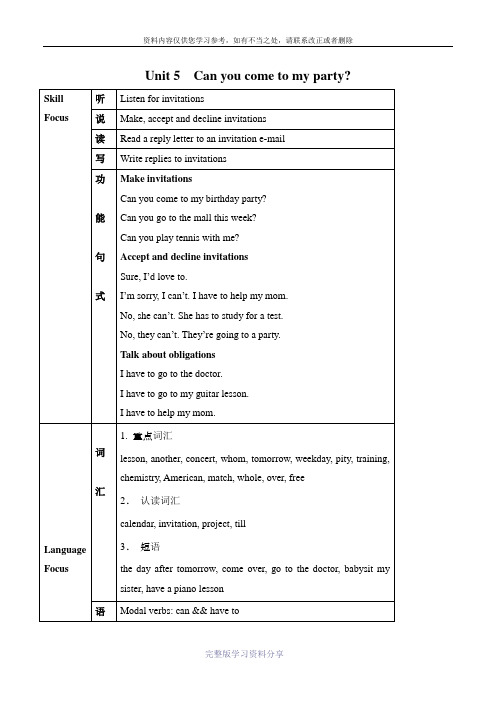
Unit 5 Can you come to my party?II. Teaching materials analyzing and rearranging 教材分析和教材重组1. 教材分析本单元以“Invitations”为话题,通过单元学习,要求学生掌握如何用Can you ...?结构,在日常生活中发出邀请并能根据实际情况接受或拒绝邀请,进而实现对目标语言的运用。
学习完本单元后,学生将能谈论自己或别人必须做的事情并能根据日程表中的计划安排自己的活动,自己制作英文请柬。
并能在学习语言过程中了解中西方在接受和回绝邀请方面的差异,增强他们在日常生活中的沟通和交流能力。
Section A第一部分围绕思维(1a)、听力(1b)、会话(1c)三方面对Can you ...?句型进行训练。
第二部分在对情态动词can和can’t的用法进行训练(2a)的基础上,介绍回答目标语言的不同方式(2b);2c部分的会话训练则是对目标语言的综合运用。
第三部分继续围绕目标语言展开,强调将学生的动口能力和动手能力结合起来,自己制作邀请函(3a,3b)。
4以要求一个朋友一起到购物中心为主题,结合日程安排,谈论本周的计划安排。
Section B 第一部分引入一周的日历,对本单元的新单词及词组进行学习(1a,1b)及会话训练(1c)后,第二部分关于Andy 邀请Vince去打网球的录音则是对目标语言进行的听力(2a,2b)和口语(2c)方面的训练;第三部分围绕一篇同步阅读文章开展活动,要求学生在读懂文章的基础上填充表格(3a)并能根据自己的想象力完成另一封电子邮件(3b)。
3c是开放式的写作训练。
4以对话的形式继续就上一部分中的话题进行口语训练,体现了目标语言的功能性。
Self check 1要求学生对所学词汇进行应用性填空训练;2要求学生根据日程安排对三封邀请函进行回答,把目标语言和真实场景结合起来,是对学生语言应用能力的综合评价。
八年级英语上册 Unit 5 Can you come to my party(第5课时)
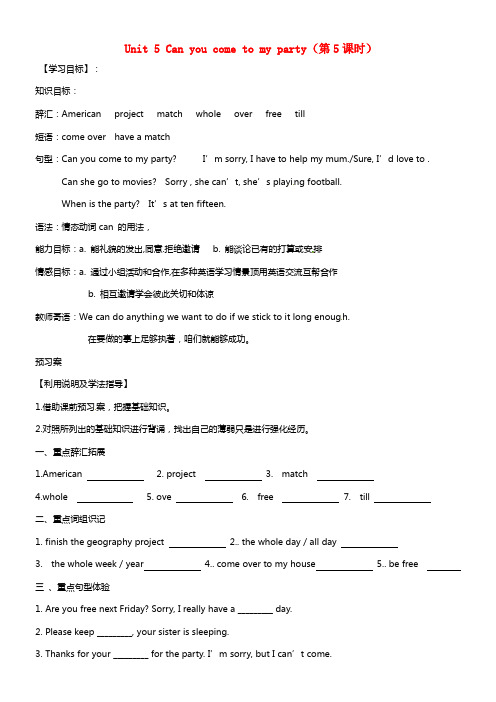
Unit 5 Can you come to my party(第5课时)【学习目标】:知识目标:辞汇:American project match whole over free till短语:come over have a match句型:Can you come to my party? I’m sorry, I have to help my mum./Sure, I’d love to .Can she go to movies? Sorry , she can’t, she’s playi ng football.When is the party? It’s at ten fifteen.语法:情态动词can 的用法,能力目标:a. 能礼貌的发出,同意.拒绝邀请 b. 能谈论已有的打算或安排情感目标:a. 通过小组活动和合作,在多种英语学习情景顶用英语交流互帮合作b. 相互邀请学会彼此关切和体谅教师寄语:We can do anythin g we want to do if we stick to it long enoug h.在要做的事上足够执著,咱们就能够成功。
预习案【利用说明及学法指导】1.借助课前预习案,把握基础知识。
2.对照所列出的基础知识进行背诵,找出自己的薄弱只是进行强化经历。
一、重点辞汇拓展1.American2. project3. match4.whole5. ove6. free7. till二、重点词组识记1. finish the geography project2.. the whole day / all day3. the whole week / year4.. come over to my house5.. be free三、重点句型体验1. Are you free next Friday? Sorry, I really have a _________ day.2. Please keep _________, your sister is sleeping.3. Thanks for your _________ for the party. I’m sorry, but I can’t come.4. He often works late _________ 12 o’clock at night.5. Would you like to come _________ to my house f or dinner/6. She didn’t come to the dancing party because of her_________(ill).7. If you want to be thinner, you must try to eat _________ meat.8. Can you tell me the_________ story? I know nothing abuot it.【学习建议】牢记讲义中的典型句型语长难句。
八年级英语上_Unit_5_can_you_come_to_my_party_课件人教版新课标

A: Hey, Dave, can you go to the movies on Saturday? B: I’m sorry, I can’t. I have too much homework this weekend. A:That’s too bad. Maybe another time. B: Sure, Joe. Thanks for asking.
A: Can they play football with us? B: When is it? A: It’s on Sunday afternoon. B: Sure, they’d love to Yes, they can.
B: No, they can’t. They have an English test. They are visiting their teachers. They have to do their homework.
1. Thanks for your i nvitation to visit next Monday. 2. Can you come o ver to my house to j oin our music club? 3. He is d iscussing the science report with his classmates. 4. He has piano l esson every Friday. 5. They are having a football m atch . 6. Can they go to the c oncert . 二、选择正确的词 1. Thank you for asking (ask/ asking), but I can’t go to the movies with you. 2. Paul has to study for (at/ for) the math test tonight. 3. My mother has too much (much/ many) homework to do. 4. Can you come to my party on (at/ on) Saturday night? 5. She invites me to watch (watch/ to watch) the basketball match the day after tomorrow. 6. I like playing the piano (piano/ the piano). 三、选择题 1. Can you play tennis with A on Saturday ? A: us B: we C: our D: ours
新目标英语八年级上Unit 5 Can you come to my party

新目标英语八年级上Unit 5 Can you cometo my party新目标英语八年级上Unit 5 Can youaPeriod 教案教材分析:本单元主要内容是学习如何礼貌地发出,接受,拒绝邀请;谈论自己和别人的义务和责任.;学习如何安排好日程表同时根据日程表中的计划安排自己的活动。
教学理念分析: G新目标英语,实行的是新课程标准,采用的是任务型语言教学(Task–Based Language Teaching)模式,教学设计和教学过程,应充分发挥学生的主体地位,教师的主导作用,创造设计切实可行的真实的语言交际情景和任务,让学生体验、实践、使用目标语,进行交际和解决问题——完成任务,让学生传达信息和体验成就感,增加兴趣,真正落实教学情景化和教学步骤交际化原则,落实在做中学、用中学、学中用的原则.教学目标:1.知识目标:a.学习,理解掌握和运用以下单词: lesson calendaw invitation whole till invb.学习,理解掌握和运用以下词组 baseball game ;football match; the day aw; the day bday ;come over to, have a piano lesson another(next)学习,理解掌握和运用以下句子:Canyouarty? Can he/she gbaseball game? Can they g?I can’t. Sure, I’d love to./ Great. I’d lovand have fuand join us. Maybe another /nexThank you for asking/inviting me/your invita2能力目标a.能礼貌的发出,接受.拒绝邀请b.能谈论已有的计划或安排c.能用情态动词havd.能用现在进行时表示将来计划或安排.3情感目标a.通过小组活动和合作,在多种英语学习情景中用英语交流互帮互助b.互相邀请学会相互关心和体谅教学重点和难点1本单元的重要词汇和句型.2如何发出.接受拒绝邀请3,如何写邀请卡和邀请信4如何写电子邮件或便条来回复邀请.课时安排:4课时,本教案例是A的两课时Teaching proceduPeriod 1(A 1a-2c)Warm-up(课前热身,激发学生兴趣)T: What weekend activities do you know? Make a l: Study for a test/ go to a movie /have a piano lesson/su/ hel/vgrandfather /play basketball and让学生把所知活动写在黑板上,这样既为下一步要用到活动名提供了选择和参考,又让学生学习以前知识且能体验到成就感,兴趣大增,在列举的基础上补充如Gdoctor/gbaseball game/ have a guitar lesson等且写在黑板上2导入新课T; What activities do you want to do this weekend?S:I want to …T: What activities do you not want to do?S:I don’t waudy for a test/…T;u don’t lactivities but you have to d把句型You have to dg.写在黑板上,这样导入了表示拒绝的重点句型I have to…然后问学生是否能参加我的生日晚会(晚会时间各不相同有上课时,周末等)回答中必然有肯定和否定两种,帮助学生回答完整且把下列对话写在黑板上.A: Can youarty?B: Sure , I’d love to .ThaaskingI can’t. I havea piano lesson/have too much homework…I’I can’t . I have to hel/gdI’I can’t. I’m playing/goingv这样表示拒绝的三种理由表达法都呈现出来了,.下一步学生就会使用以上三种句型来拒绝邀请Pairwork(2c)Task: Give and adecline invitaairs like2c.Then ask several pairs to act ouversa此任务是学以致用,利用以上所学来向对方提出或拒绝或接受邀请,这样一来学生在使用目标语中慢慢掌握了本节课重点内容Groupw 当最后两组学生互相邀请时,随后问全班同学Can he/arty ?Helanswer .No he /she can’t. He /She has a football lesson /has to hel/is surfing the IThen alass to ask and answallowing conversaA: Can you gvies?B:I can’t . I have to gd: Can he gvies?A: No he can’t .He has to gd通过练习会话,操练和掌握了第三人称的相关内容Invitation andTask1: Invite five classmates to aTask2: Rult.假设马上有一个音乐会,六人为一组,一人邀请其余五人同去,然后汇报邀请结果,这样学中用,用中学既练习如何发出,接受和拒绝邀请,同时练习了用第三人称汇报邀请结果ListeningTask: Lb,2a2b andx在训练熟练的基础上再做听力,既能起到再次训练和巩固的作用,有能让学生体验到成功的喜悦,提高学习兴趣和听力。
八年级上册英语Unit5_can_you_come_to_my_party知识点总结
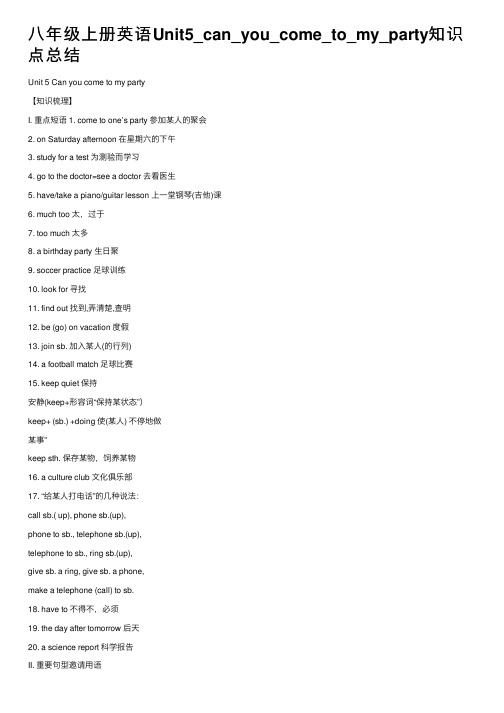
⼋年级上册英语Unit5_can_you_come_to_my_party知识点总结Unit 5 Can you come to my party【知识梳理】I. 重点短语 1. come to one’s party 参加某⼈的聚会2. on Saturday afternoon 在星期六的下午3. study for a test 为测验⽽学习4. go to the doctor=see a doctor 去看医⽣5. have/take a piano/guitar lesson 上⼀堂钢琴(吉他)课6. much too 太,过于7. too much 太多8. a birthday party ⽣⽇聚9. soccer practice ⾜球训练10. look for 寻找11. find out 找到,弄清楚,查明12. be (go) on vacation 度假13. join sb. 加⼊某⼈(的⾏列)14. a football match ⾜球⽐赛15. keep quiet 保持安静(keep+形容词“保持某状态”)keep+ (sb.) +doing 使(某⼈) 不停地做某事”keep sth. 保存某物,饲养某物16. a culture club ⽂化俱乐部17. “给某⼈打电话”的⼏种说法:call sb.( up), phone sb.(up),phone to sb., telephone sb.(up),telephone to sb., ring sb.(up),give sb. a ring, give sb. a phone,make a telephone (call) to sb.18. have to 不得不,必须19. the day after tomorrow 后天20. a science report 科学报告II. 重要句型邀请⽤语1. Can you come to my party?= Would you like to come to my party?肯定回答:Sure, I'd love to.否定回答:I'm sorry. I can't. I have to do my homework.2. Maybe another time.3. Thanks for asking (inviting). 谢谢邀请。
八年级英语上册 Unit 5 Can you come to my party教材全梳理 人教新目标
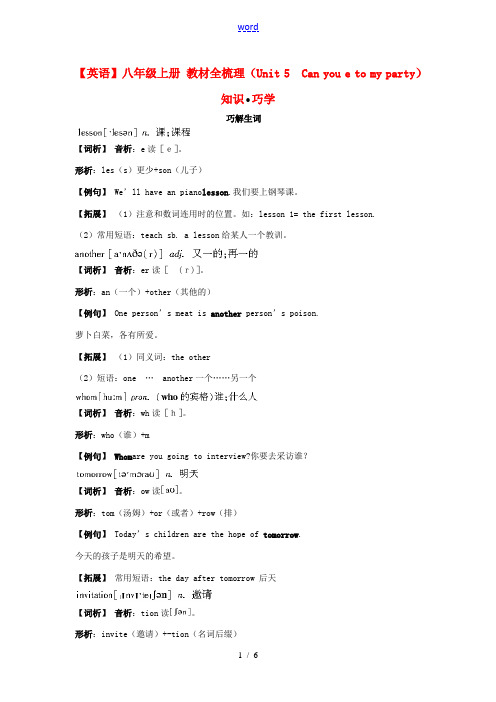
【英语】八年级上册教材全梳理(Unit 5 Can you e to my party)知识•巧学巧解生词【词析】音析:e读[e]。
形析:les(s)更少+son(儿子)【例句】We’ll have an piano lesson.我们要上钢琴课。
【拓展】(1)注意和数词连用时的位置。
如:lesson 1= the first lesson.(2)常用短语:teach sb. a lesson给某人一个教训。
【词析】音析:er读[(r)]。
形析:an(一个)+other(其他的)【例句】One person’s meat is another person’s poison.萝卜白菜,各有所爱。
【拓展】(1)同义词:the other(2)短语:one…another一个……另一个【词析】音析:wh读[h]。
形析:who(谁)+m【例句】 Whom are you going to interview?你要去采访谁?【词析】音析:ow读。
形析:tom(汤姆)+or(或者)+row(排)【例句】Today’s children are the hope of tomorrow.今天的孩子是明天的希望。
【拓展】常用短语:the day after tomorrow 后天【词析】音析:tion读。
形析:invite(邀请)+-tion(名词后缀)【例句】 Thanks for your invitation! 谢谢你的邀请!【拓展】(1)同根词:invite(2)常用短语:a letter of invitation 一封邀请信【词析】音析:i读[I]。
形析:形近词city【例句】It’s a pity that you did not e.很遗憾你没来。
【拓展】(1)惯用法:What a pity!真遗憾!(2)短语:feel pity for sb. 同情某人;out of pity出于同情【词析】音析:o读。
新目标英语八年级上:Unit5Canyoucometomyp

新目标英语八年级上:Unit5Canyoucometomyp新目标英语八年级上:Unit5 Can you come to my party课题新目标英语八年级上Unit5 Can you come to my party ?作者及工作单位定远县池河中学童阿琴教材分析本单元是八年级上册第五单元,前面已经涉及到情态动词的用法,在这一单元中,我们将着重对比can和could的用法,尤其是当表示请求时,could比can更委婉,更客气的`用法。
学情分析本单元的教学对象是八年级的学生,他们已经学习了一学期的英语,能够听懂并使用最基本的英语课堂表达;教学内容是发出邀请,贴合学生的实际,学生容易感兴趣,也好在实际生活中进行练习,以便掌握。
教学目标1. 知识目标:can could invite come to2. 能力目标:在教师创设的情景下,在与同伴相互交流的过程中,通过发出、接受、拒绝邀请,连续礼貌地使用本课的目标语言。
学会将所学的语言运用到真实的交际生活中去。
3. 情感目标:在实际生活中,学生能够更好地、更礼貌地与人相处。
教学重点和难点学会礼貌、自如的发出邀请、拒绝邀请或接受邀请教学过程1、Step 1: Free talk(从生活中的话题入手,激活课堂,导入新课。
)(1) Talk about every day activities讨论家人每天的活动,每个学生至少说出一个。
将这些活动的短语写在黑板上,如:visit my friends, baby-sit his sister, rent the vides, go to the dentist, have the piano lessons, study for theEnglish test, etc.(2) Make sentences用黑板上的短语造句,每个学生至少做一个。
For example: I can’t visit my friends, because I have to study for my test.Step2: TaskPre-task(1) Listening2a&2b(2) Pair workStudent A invites hisher partner to do something. Student B declines heher invitation and give reasons.Task circle: Every student invites at least five classmates to do something.Post-task(1) Tell your neighbor who accepts your invitation and who refuse your invitation. Why?(2) Write a short passage.Step3: HomeworkDesign an invitation card. Invite your friends to have a barbecue on weekend. Tell them the time and place.【新目标英语八年级上:Unit5 Can you come to my party】。
八年级英语unit 5 can you come to my party 通用版知识精讲

初二英语Unit 5 Can you come to my party? 通用版【本讲主要内容】Unit 5 Can you come to my party?通过本课的学习,我们应该能做下面的事:1. 学会礼貌地发出、接受、拒绝邀请。
2. 谈论自己或别人必须做的事情。
3. 学习根据日程表中的计划安排自己的活动。
4. 学习can及其它情态动词的用法。
【知识掌握】【知识点精析】同学们,你们的课余时光是怎样度过的呢?你都有一些什么样的课余生活呢?你有没有邀请过你的好友一起看电影、打球、听音乐会或者参加聚会呢?相信你通过第五单元的学习,一定可以用准确的英语熟练地表达你的这些想法。
【词汇用法】1. lesson n. 功课、课程We had a history lesson at school this morning. 我们今天早上在学校上了一堂历史课。
an English lesson=a lesson in English 英语课give lessons in drawing 上绘画课lesson与class的区别lesson课程(更强调上课的内容);class班级(更强调上课的环境)We have four lessons in the morning and two in the afternoon. 我们上午有4节课,下午有2节。
She was in a class of thirty students. 她在一个有30个学生的班里。
2. invitation n. 邀请I have received an invitation to their party. 我收到了他们宴会的请贴。
make invitations 发出邀请accept invitations 接受邀请decline invitations 拒绝邀请invite v. 邀请Thank you for inviting me. 谢谢你的邀请。
八年级上Unit-5-Can-you-come-to-my-party说课稿
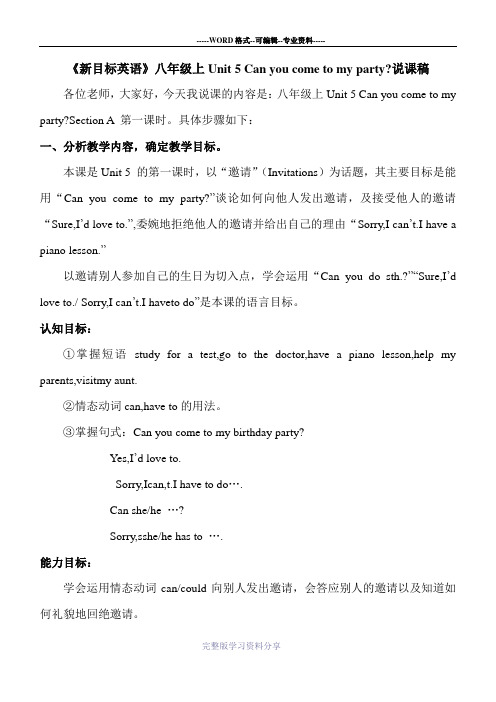
《新目标英语》八年级上Unit 5 Can you come to my party?说课稿各位老师,大家好,今天我说课的内容是:八年级上Unit 5 Can you come to my party?Section A 第一课时。
具体步骤如下:一、分析教学内容,确定教学目标。
本课是Unit 5 的第一课时,以“邀请”(Invitations)为话题,其主要目标是能用“Can you come to my party?”谈论如何向他人发出邀请,及接受他人的邀请“Sure,I’d love to.”,委婉地拒绝他人的邀请并给出自己的理由“Sorry,I can’t.I have a piano lesson.”以邀请别人参加自己的生日为切入点,学会运用“Can you do sth.?”“Sure,I’d love to./ Sorry,I can’t.I haveto do”是本课的语言目标。
认知目标:①掌握短语study for a test,go to the doctor,have a piano lesson,help my parents,visitmy aunt.②情态动词can,have to的用法。
③掌握句式:Can you come to my birthday party?Yes,I’d love to.Sorry,Ican,t.I have to do….Can she/he …?Sorry,sshe/he has to ….能力目标:学会运用情态动词can/could向别人发出邀请,会答应别人的邀请以及知道如何礼貌地回绝邀请。
情感目标:通过对本课的学习,在与人交往中学会礼貌地与人打交道,珍惜友谊,热爱生活,有责任感,这也是素质教育的“以人为本”的目标体现。
二、学生学情分析本课以“邀请”(Invitations)为话题,趣味性较强。
学生在初一已经学习了许多动词短语,为表达提供了语言基础。
八年级英语上册 Unit5《Can you come to my party》文字素材1 人教新目标版
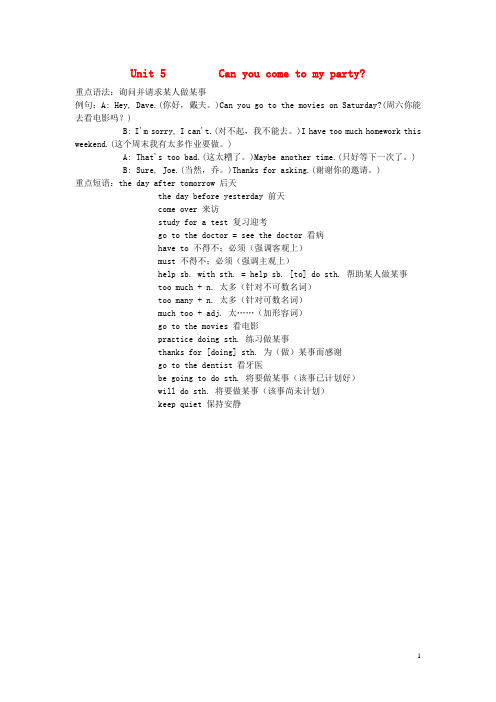
Unit 5 Can you come to my party?重点语法:询问并请求某人做某事例句:A: Hey, Dave.(你好,戴夫。
)Can you go to the movies on Saturday?(周六你能去看电影吗?)B: I'm sorry, I can't.(对不起,我不能去。
)I have too much homework this weekend.(这个周末我有太多作业要做。
)A: That's too bad.(这太糟了。
)Maybe another time.(只好等下一次了。
)B: Sure, Joe.(当然,乔。
)Thanks for asking.(谢谢你的邀请。
)重点短语:the day after tomorrow 后天the day before yesterday 前天come over 来访study for a test 复习迎考go to the doctor = see the doctor 看病have to 不得不;必须(强调客观上)must 不得不;必须(强调主观上)help sb. with sth. = help sb. [to] do sth. 帮助某人做某事too much + n. 太多(针对不可数名词)too many + n. 太多(针对可数名词)much too + adj. 太……(加形容词)go to the movies 看电影practice doing sth. 练习做某事thanks for [doing] sth. 为(做)某事而感谢go to the dentist 看牙医be going to do sth. 将要做某事(该事已计划好)will do sth. 将要做某事(该事尚未计划)keep quiet 保持安静1。
八年级英语上册 unit 5 can you come to my party知识点总结 人教新目标版
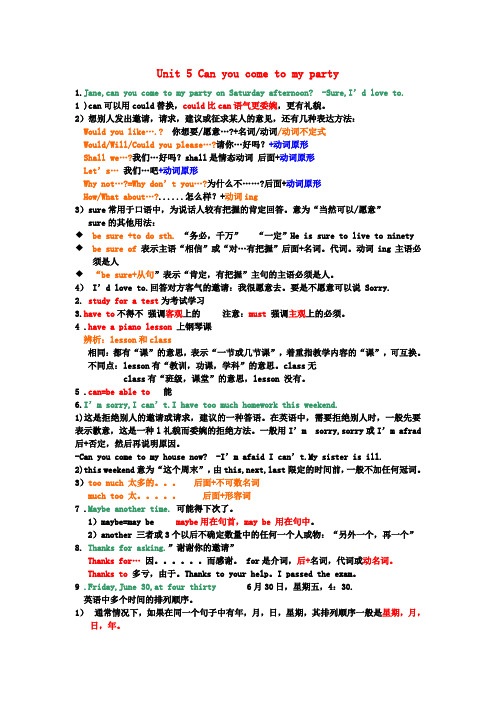
Unit 5 Can you come to my party1.Jane,can you come to my party on Saturday afternoon? -Sure,I’d love to.1 )can可以用could替换,could比can语气更委婉,更有礼貌。
2)想别人发出邀请,请求,建议或征求某人的意见,还有几种表达方法:Would you like….?你想要/愿意…?+名词/动词/动词不定式Would/Will/Could you please…?请你…好吗?+动词原形Shall we…?我们…好吗?shall是情态动词后面+动词原形Let’s… 我们…吧+动词原形Why not…?=Why don’t you…?为什么不……?后面+动词原形How/What about…?......怎么样?+动词ing3)sure常用于口语中,为说话人较有把握的肯定回答。
意为“当然可以/愿意”sure的其他用法:◆be sure +to do sth. “务必,千万” “一定”He is sure to live to ninety◆be sure of 表示主语“相信”或“对…有把握”后面+名词。
代词。
动词ing主语必须是人◆“be sure+从句”表示“肯定,有把握”主句的主语必须是人。
4)I’d love to.回答对方客气的邀请:我很愿意去。
要是不愿意可以说 Sorry.2. study for a test为考试学习3.have to不得不强调客观上的注意:must强调主观上的必须。
4 .have a piano lesson 上钢琴课辨析:lesson和class相同:都有“课”的意思,表示“一节或几节课”,着重指教学内容的“课”,可互换。
不同点:lesson有“教训,功课,学科”的意思。
class无class有“班级,课堂”的意思,lesson 没有。
5 .can=be able to 能6.I’m sorry,I can’t.I have too much homework this weekend.1)这是拒绝别人的邀请或请求,建议的一种答语。
湖南省怀化市会同三中八年级英语上册《Unit 5 Can you come to my party》

I. Teaching article(课题): Unit FiveII. Teaching aims and demands(教学目的和要求):Can you come to my birthday party?Yes, I’d love to.Sorry, I can’t. I have to study for a test.I’m sorry. I’m playing soccer on Saturday. When is the party?It’s at seven-thirty.III. Teaching importance and difficulty(教学重难点): Make, accept and decline invitation.Talk about obligation.IV. Teaching ways(教学方法):Revision, Learning, Practice and Reading.V. Teaching tools(教学工具):Tape-recorder and Lantern.V. Teaching time(教学时间):Six periodsVI. Teaching procedure(教学过程):P. 25 The first periodI. Teaching Aims and Demands1. Knowledge ObjectsKey vocabulary.Target language.Groupwork.2. Ability ObjectsLearning skill.Communicative competence.3. Moral ObjectLearn some foreign culture.II. Teachin g Importance and DifficultyTarget language.Can you come to my party on weekend?Sure, I’d love to.Sorry, I can’t. I have a piano lesson.I’m sorry, too. I have to go to the doctor.III. Teaching MethodsListening method.Learning approach.IV. Teaching AidsA tape recorder.OHP.V. Teaching ProceduresStep I Greet the class as usual and check the homework.Step II Section AT: Can you come to my party?Show these expression on the blackboard by a projector. Read th e expression to the class and ask the students to repeat each one.S: I’d love to … I’m sorry , I have to …Step III 1aRead after me:Helping his parents studying for a testGoing to the doctor babysittingHaving a piano lessonThen ask students to write the letter of the correct picture in the blank next to each of the phrases.Step IV 1bLet the students to complete the activity individually.Listen carefully.Ask students to complete the activity individually.Then correct the answers.Step V 1c GroupworkFirst let four students read the example in the speech bubbles to the class.A: Can you come to my party on Wednesday?B: Sure, I’d lov e to.C: Sorry, I can’t. I have a piano lesson.D: I’m sorry, too. I have to go to the doctor.Then help students form groups of four.Step VI An Optional ActivityAsk students to practice some invitation and refusals. Play the recordings for the class and have a student ask about any wordsor sentences they can’t understand.Step VIII Culture NoteIn some cultures, it is not considered polite to accept an invitation the first time it is offered. In such places people usually thank the people but do not give a definite answer at that time.Step IX Summary and HomeworkThis class we’ve learnt some key vocabulary and the target language. After class ask write the phrases in 1a down in your exercise books.Step X Blackboard DesignUnit 5 Can you come to my party?How about… Polite…What about… Impolite…P. 26 The second periodI. Teaching Aims and Demands1. Knowledge ObjectsKey vocabulary.Target language.Grammar focus.2. Ability ObjectsLearning skill.Communicative competence.3. Moral ObjectIt’s polite to refuse one’s invitation if you can’t go.II. Teaching Impor tance and DifficultyTarget language.Can you come to my party on weekend?Sure, I’d love to.Sorry, I can’t. I have a piano lesson.I’m sorry, to o. I have to go to the doctor.III. Teaching MethodsGrammar Focus.Pairwork.IV. Teaching AidsA tape recorder.Cards with “Yes” and “No” for Follow-up Activity 1.V. Teaching ProceduresStep I Greet the class as usual and check the homework.Step II 2aNow tell students we’ll have five conversations.Conversation 1:Anna: Hi, Jeff. Can you come to my party on Saturday?Jeff: I’m sorry, I can’t. I have to visit my aunt on Saturday. Conversation 2:Anna: Hello, Marry. Can you come to my party on Saturday? Marry: I’d love to.Conversation 3:Anna: May Lee, can you come to my party tomorrow?May Lee: I’m sorry. I have to help my mom.Conversation 4:Anna: Claudia, Can you come to my party on Saturday?Claudia: I’m sorry. I’m going to the movies.Conversation 5:Anna: Say, Paul. Can you come to my party on Saturday?Paul: I’d love to.Step III An Activity Pick a CardRead after me:Prepare fifteen cards to give students. Five of the cards have the word Yes on them. Ten of the cards have the word along with the name of an activity.Step IV 2bAsk a student to read the five sentences in Activity 2b. Tell students these are the reasons why people can’t go to the party. Now listening to the recording again.Step V 2c PairworkNow let students look at the sample conversation in the book. Ask a pair of students to read it to the class.A: Hey, Dave, can you come to my party on Saturday?B: I’m Sorry, I can’t. I have too much homework.A: That’s too bad. Maybe another time.B: Sure, Joe. Thanks for asking.Step VI Grammar FocusReview the grammar box. Ask students to say the questions and answers.Talk about the two ways people give reasons for saying no to an invitation.Step VII Summary and HomeworkThis class we’ve learnt how to say “no” to someone’s invitation and give a re ason. After class copy the grammar box in your exercise books..Step VIII Blackboard DesignUnit 5 Can you come to my party?Has to have toShe play basketball.He study.They go to a party.I to study for a test.P. 27 The third periodI. Teaching Aims and Demands1. Knowledge ObjectsReview vocabulary items.Oral practice.2. Ability ObjectsReading skill.Writing skill.Communicative competence.3. Moral ObjectUse computers to help with your study.II. Teaching Importance and DifficultyReview vocabulary items.Oral practice using target language.III. Teaching MethodsGrammar Focus.Pairwork.IV. Teaching AidsA picture of computer.A tape recorder.V. Teaching ProceduresStep I Gree t the class as usual and check the homework.Step II 3aShow an invitation in the blackboard.Lisa: Hi, Simon. Can you come to my party?Simon: When is it?Lisa: It’s on Friday June 30 at four-thirty.Simon: I’d love to.Step III 3b pairworkPractice the conversation in 3a. Then fill in the card with details of a event.Then call yourclassmates to invite him or her to the event.Step IV 4 Invite a FriendTell the class how to do the activity. For example:Li Hua, you are Lu Eliza. Look at the this page.Fang Fang you are Lu Qing. Look at the page 87.Look at your calendar for this week.Then make a dialogue.Step VShow the picture on the blackboard.Tell students Evite is the web’s leading in line invitation service. It’s easy to get people together and b est of all, it’s FREE!Step VI SummaryToday we’ve learnt how to write an invitation and done a lot of pratice.Step VII HomeworkIf you have a computer, you may send the invitation each other.Step VIII Blackboard DesignUnit 5 Can you come to my party?Lu Qing ElizaWednesday afternoonFriday afternoonSaturdaySundayP. 28 The fo urth periodI. Teaching Aims and Demands1. Knowledge ObjectsKey vocabulary.Target language.Oral practice.2. Ability ObjectsListening skill.Speaking skill.Communicative competence.3. Moral ObjectPrepare for the next class game.II. Teaching Importance and DifficultyWhat’s today?It’s Monday the 14th.Can you play tennis with me?When?Today.Sorry, I can’t.III. Teaching MethodsListening and speaking methods.Communicative approach.Pairwork.IV. Teaching AidsA current wall calendar.A tape recorder.V. Teaching ProceduresStep I Greet the class as usual and check the homework. Ask students if they send invitation by computer each other.Step II Section B 1aFirst let students look at the days of the week at the top of calendar in the book. Read the words and ask them to repeat.Then display a current calendar and ask a student to copy them numbers into the calendar in their books.Step III 1bShow the words on the blackboard:Yesterday: 昨天Today: 今天Tomorrow : 明天;明日The day after tomorrow: 后天Now ask students to write the words below the correct dates on the calendar in 1a.Step IV 1c PairworkAsk the students to read the dialogue in the speech bubble.A: What’s today?B: It’s Monday the 14th.Then have students work in pairs. One student point to a date and asks, what’s today? The other student answers, It’s .Step V 2aFirst let students look at the picture.Ask students to tell what the boy is doing.(He’s talking on the phone.Play the recording for the first time. Students only listen. Then play it again. This time ask students to circle yes or no.Step VI 2bNow look at the list of five activities. Ask a student to read it to the class.Call attention to the three lettered words: a. today b. tomorrow c. the day after tomorrow. Step VII Summary and HomeworkToday we’ve reviewed the days of the week. And we’ve leant some key vocabulary and the target language. We have leant how to ask the date, how to invite some body and how to refuse and give a reason. Next class we’ll do a game: Name That Day.Step VIII Blackboard DesignUnit 5 Can you come to my party?Sun Mon Tue Wed Thu Fri SatP. 29 The fifth periodI. Teaching Aims and Demands1. Knowledge ObjectsE-mail message.Writing practice.Reading practice.2. Ability ObjectsReading and writing skills.Communicative competence.3. Moral ObjectAsk your friends and classmates to your birthday party and have a good time.II. Teaching Importance and DifficultyReading passage.I’m + verb + ing.I have to + verb.Reading and writing practice.III. Teaching MethodsReading and writing methods.Communicative approach.Groupwork.IV. Teaching AidsA picture of a computer.A wall calendar.V. Teaching ProceduresStep I Greet the class as usual.Step II Play a Game: Name That DayPlay a game of speed with the class. Display the wall calendar. Say a student’s name, point to a date on the calendar and sa y either yesterday, today or tomorrow. Give the winners little presents.Step III 3aNow open your books at page 29. First I’ll read the e-mail message to you. Have you any questions about this e-mail message.Tell the students to read the e-mail message again and complete Sonia’s answers.Step IV 3bPoint out the sample answer and ask students to use their imagination to complete the e-mail. Tell students to use “I’m + verb + ing.”or “I have to + verb.”Ask the students to complete the activity on their own.Step V 3cAsk students to give some sample answers. Write them on the blackboard. For example,I can’t visit you next week.I have to go to school on Monday.I’m playing soccer on Tuesday.On Wednesday, I’m going on vacation.Step VI 4 Groupwork Plan a Party!First ask two students to read the conversation in the speech bubble.A: Can you come to my party?B: When is it?A: Next week. ON Thursday night.B: I’m sorry. I have to study for a math test.Then ask students to turn to page 88.Step VII Topic for DiscussionHave you had your birthday party? Did you have a good time? Have you invited your friends and classmates?Now let students have practice.Step VIII Summary and HomeworkWe’ve leant how to write an e-mail and had a discussion.Now homework. Read the e-mail message again.Step VIII Blackboard DesignUnit 5 Can you come to my party?Sample sentencesI can’t visit you next week.I have to go to school on Monday.I’m playing on Tuesday.On Wednesday, I’m going on vacation.P. 30 The sixth periodI. Teaching Aims and Demands1. Knowledge ObjectsReview key words and target language of the unit.Reading and writing practice.2. Ability ObjectsReading and writing skills.3. Moral ObjectBeethoven, a famous musician.II. Teaching Importance and DifficultyReading and writing practice.Review key vocabulary and the target language.III. Teaching MethodsReading and writing methods.IV. Teaching AidsA projector.V. Teaching Pr oceduresStep I Greet the class as usual and check the homework.Step IIShow some new words on the blackboard.Read the wor ds to the class and ask students to repeat. Make sure everyone understands its meaning.Step III Self check 1Ask students to fill in the blanks on their own.Check the answers:1. My American friend is going to visit me next vacation.2. Are you playing football this weekend?3. Please keep quiet! I’m trying to study.4. I can’t join you because I have to help my mom.5. Do you want to come to my birthday party?Step IV 2Ask students to read the invitation.Imagine you are Marie. Look at your schedule. Write replies to the invitations.Tell Rose, Julie, walk around the class offering language support where necessary.Step V Just for Fun!Ask students to read the cartoon to themselves.Then have two students read the words to the class.Help students understand that it’s the famous musician, Beethoven, who has to practice the piano.Step VI Read about Meimei and JudyJudy is coming to the party. She wants to help Meimei on Saturday, but she can’t. She has a soccer game in the morning. And in the afternoon, she’s going to her uncle’s house. She’s coming to the party at 8:00.Step VII SummaryToday we’ve reviewed the key vocabula ry and the target of the unit by reading and writing. Step VIII HomeworkFinish off the exercise of workbook.Step VIII Blackboard DesignUnit 5 Can you come to my party?BeethovenA famous musicianPractice the pianoVII. Teaching conclusion(教学后记):。
湖南专用人教版英语八年级上Unit5CanyoucometomypartySectionB1课件

Explanation
1. What’s today? 今天是几号?星期几? (1).What’s today? 用来询问星期和日期。 (2).What day is today? 用来询问星期几。 (3).What’s the date today? 用来询问日期。 2. It’s Wednesday, 22nd .今天是22号,星期三 。 it 在句子中表时间。例如: It’s on Tuesday, July 15th at three thirty. 时间定在七月十五,星期二,三点半。
二、根据速写形式写出1---31序数词: 1st first 5th fifth 2nd second 8th eighth 3rd third 4th fourth 9th ninth 10th tenth
11th eleventh 12th twelfth 13th thirteenth 15th fifteenth 19th nineteenth 20th twentieth 21st twenty-first 22nd twenty second
Groupwork
A: What’s today? B: It’s …What was yesterday? C: It was…What’s tomorrow? D: It’s…What’s the day after tomorrow? A: It’s…
2012年10月 W
3 10 17 24 31
S
7 14 21 28
M
1 8 15 22 29
T
2 9 16 23 30
T
4 11 18 25
F
5 12 19 26
S
6 13 20 27
(八年级资料)八年级英语上册unit5canyoucometomypartyperiod1

单元〔章〕主题U nit 5 Can you come to my party?任课与班级本课〔节〕内容Section A:1a , 1b ,1c ,2a ,2b.第 1 课时/ 共4课时教学目标〔含重点、难点〕及设置依据Teaching goals :1. vocabubary: lesson , hey , baseball game ,test ,, guitar , aunt , concert , party .2. Patterns: Can you come to my party ?Sure, I’d love to .Sorry ,I can’t . I have to … .3. 能力目标:学会邀请别人以及答复的方式.4. 情感目标:培养学生礼貌用语的习惯.教学准备A tape recorder.教学过程内容与环节预设个人二度备课课后反思Teaching procedures :Step 1 leading inPlay the song : Happy birthday .Say ,today it’s Meimei’s birthday .She wants to invite er birthday party .Can you tell me what she should say ?Ask students to say .Step 2 Pre-taskPage 25 ,1a ,1b .Ask ,Can you come to my party ?Ask some students to answer .Ask the students who say o to say why .Call attention to the words in Activity 1a. Read.Say ,look at the picture .Ask Ss to tell what they see in ne .Match the words with the picture and check the.Say ,now listen to the recording .Write the name of each ext to his or her picture .Play the recording .Ask Ss to complete the activityally .Correct the answers .Step 3 While-taskSB Page25 , 1c.Point to the example in the box .Ask Ss to do a practice ners .Ask some groups to act .Game:]One student invite some students to his/her party .The dents answer . Whose birthday is today?[ Let’s sing the song together for him\her\them.Practice Can to express different polite requests and invitations.Prctice new words according to the pronunciation.What is …doing ?…is ving.Write “I’d love to〞and “I’m sorry.〞on the blackboard.内容与环节预设个人二度备课课后反思SB Page 26, 2a .Point to the five sentences .Say ,listen to each conversation and then circle the word es the sentences correct .Play the recording .Check the answers .SB Page 26 ,2b .Call attention to the five sentences in activity 2a ,Ask a student to read these sentences to the class saying the corre ct word “can〞or “can’t〞.Say ,now listen to the recording again .Write the number of the conversation (1 through 3) in he reasons .Play the recording .Write down these answers .Check the answers .Step 4 Post-taskSB Page 26 ,2c .Call attention to the points listed in activity 2b .Ask students to make their own conversation like the.As students work ,move around the room and monitor .Ask some students to present their dialogue .Step 5 HomeworkPractice :Invite your friends to come to your party .Write down their answers . Students make some sentences with the words “can〞and “can’t〞before dealing with ex 2a.Summary and practise translation:Have to + doSee the doct or, have a piano lesson,Study for the test,Maybe another time.Thanks for asking.作业布置1.write a dialogue invitingsomebody 3.write a passageabout the dialogue in 1b2.make sentences with new words.教后整体反思The contents are not so hard in the lesson and so students can practise dialogues with interest and efficiency.。
- 1、下载文档前请自行甄别文档内容的完整性,平台不提供额外的编辑、内容补充、找答案等附加服务。
- 2、"仅部分预览"的文档,不可在线预览部分如存在完整性等问题,可反馈申请退款(可完整预览的文档不适用该条件!)。
- 3、如文档侵犯您的权益,请联系客服反馈,我们会尽快为您处理(人工客服工作时间:9:00-18:30)。
湖南省怀化市会同三中八年级英语上册《Unit 5 Can you come to my party》教案2 人教新目标版I. Teaching article(课题): Unit FiveII. Teaching aims and demands(教学目的和要求):Can you come to my birthday party?Yes, I’d love to.Sorry, I can’t. I have to study for a test.I’m sorry. I’m playing soccer on Saturday.When is the party?It’s at seven-thirty.III. Teaching importance and difficulty(教学重难点):Make, accept and decline invitation.Talk about obligation.IV. Teaching ways(教学方法):Revision, Learning, Practice and Reading.V. Teaching tools(教学工具):Tape-recorder and Lantern.V. Teaching time(教学时间):Six periodsVI. Teaching procedure(教学过程):P. 25 The first periodI. Teaching Aims and Demands1. Knowledge ObjectsKey vocabulary.Target language.Groupwork.2. Ability ObjectsLearning skill.Communicative competence.3. Moral ObjectLearn some foreign culture.II. Teachin g Importance and DifficultyTarget language.Can you come to my party on weekend?Sure, I’d lo ve to.Sorry, I can’t. I have a piano lesson.I’m sorry, too. I have to go to the doctor.III. Teaching MethodsListening method.Learning approach.IV. Teaching AidsA tape recorder.OHP.V. Teaching ProceduresStep I Greet the class as usual and check the homework.Step II Section AT: Can you come to my party?Show these expression on the blackboard by a projector. Read th e expression to the class and ask the students to repeat each one.S: I’d love to … I’m sorry , I have to …Step III 1aRead after me:Helping his parents studying for a testGoing to the doctor babysittingHaving a piano lessonThen ask students to write the letter of the correct picture in the blank next to each of the phrases.Step IV 1bLet the students to complete the activity individually.Listen carefully.Ask students to complete the activity individually.Then correct the answers.Step V 1c GroupworkFirst let four students read the example in the speech bubbles to the class.A: Can you come to my party on Wednesday?B: Sure, I’d love to.C: Sorry, I can’t. I have a piano lesson.D: I’m sorry, too. I have to go to the doctor.Then help students form groups of four.Step VI An Optional ActivityAsk students to practice some invitation and refusals. Play the recordings for the class and have a student ask about any wordsor sentences they can’t understand.Step VIII Culture NoteIn some cultures, it is not considered polite to accept an invitation the first time it is offered. In such places people usually thank the people but do not give a definite answer at that time.Step IX Summary and HomeworkThis class we’ve learnt some key vocabulary and the target language. After class ask write the phrases in 1a down in your exercise books.Step X Blackboard DesignUnit 5 Can you come to my party?How about… Polite…What about… Impolite…P. 26 The second periodI. Teaching Aims and Demands1. Knowledge ObjectsKey vocabulary.Target language.Grammar focus.2. Ability ObjectsLearning skill.Communicative competence.3. Moral ObjectIt’s polite to refuse one’s invitation if you can’t go.II. Teaching Impor tance and DifficultyTarget language.Can you come to my party on weekend?Sure, I’d love to.Sorry, I can’t. I have a piano lesson.I’m sorry, to o. I have to go to the doctor.III. Teaching MethodsGrammar Focus.Pairwork.IV. Teaching AidsA tape recorder.Cards with “Yes” and “No” for Follow-up Activity 1.V. Teaching ProceduresStep I Greet the class as usual and check the homework.Step II 2aNow tell students we’ll have five conversations.Conversation 1:Anna: Hi, Jeff. Can you come to my party on Saturday?Jeff: I’m sorry, I can’t. I have to visit my aunt on Saturday. Conversation 2:Anna: Hello, Marry. Can you come to my party on Saturday? Marry: I’d love to.Conversation 3:Anna: May Lee, can you come to my party tomorrow?May Lee: I’m sorry. I have to help my mom.Conversation 4:Anna: Claudia, Can you come to my party on Saturday?Claud ia: I’m sorry. I’m going to the movies.Conversation 5:Anna: Say, Paul. Can you come to my party on Saturday?Paul: I’d love to.Step III An Activity Pick a CardRead after me:Prepare fifteen cards to give students. Five of the cards have the word Yes on them. Ten of the cards have the word along with the name of an activity.Step IV 2bAsk a student to read the five sentences in Activity 2b. Tell students these are the reasons why people can’t go to the party. Now listening to the recording again.Step V 2c PairworkNow let students look at the sample conversation in the book. Ask a pair of students to read it to the class.A: Hey, Dave, can you come to my party on Saturday?B: I’m Sorry, I can’t. I have too much homework.A: That’s too bad. Maybe anothe r time.B: Sure, Joe. Thanks for asking.Step VI Grammar FocusReview the grammar box. Ask students to say the questions and answers.Talk about the two ways people give reasons for saying no to an invitation.Step VII Summary and HomeworkThis class we’ve learnt how to say “no” to someone’s invitation and give a reason. After class copy the grammar box in your exercise books..Step VIII Blackboard DesignUnit 5 Can you come to my party?Has to have toShe play basketball.He study.They go to a party.I to study for a test.P. 27 The third periodI. Teaching Aims and Demands1. Knowledge ObjectsReview vocabulary items.Oral practice.2. Ability ObjectsReading skill.Writing skill.Communicative competence.3. Moral ObjectUse computers to help with your study.II. Teaching Importance and DifficultyReview vocabulary items.Oral practice using target language.III. Teaching MethodsGrammar Focus.Pairwork.IV. Teaching AidsA picture of computer.A tape recorder.V. Teaching ProceduresStep I Gree t the class as usual and check the homework. Step II 3aShow an invitation in the blackboard.Lisa: Hi, Simon. Can you come to my party?Simon: When is it?Lisa: It’s on Friday June 30 at four-thirty.Simon: I’d love to.Step III 3b pairworkPractice the conversation in 3a. Then fill in the card with details of a event.Then call your classmates to invite him or her to the event.Step IV 4 Invite a FriendTell the class how to do the activity. For example:Li Hua, you are Lu Eliza. Look at the this page.Fang Fang you are Lu Qing. Look at the page 87.Look at your calendar for this week.Then make a dialogue.Step VShow the picture on the blackboard.Tell students Evite is the web’s leading in line invitation service. It’s easy to get people together and best of all, it’s FREE!Step VI SummaryToday we’ve learnt how to write an invitation and done a lot of pratice.Step VII HomeworkIf you have a computer, you may send the invitation each other.Step VIII Blackboard DesignUnit 5 Can you come to my party?Lu Qing ElizaWednesday afternoonFriday afternoonSaturdaySundayP. 28 The fo urth periodI. Teaching Aims and Demands1. Knowledge ObjectsKey vocabulary.Target language.Oral practice.2. Ability ObjectsListening skill.Speaking skill.Communicative competence.3. Moral ObjectPrepare for the next class game.II. Teaching Importance and DifficultyWhat’s today?It’s Monday the 14th.Can you play tennis with me?When?Today.S orry, I can’t.III. Teaching MethodsListening and speaking methods.Communicative approach.Pairwork.IV. Teaching AidsA current wall calendar.A tape recorder.V. Teaching ProceduresStep I Greet the class as usual and check the homework. Ask students if they send invitation by computer each other.Step II Section B 1aFirst let students look at the days of the week at the top of calendar in the book. Read the words and ask them to repeat.Then display a current calendar and ask a student to copy them numbers into the calendar in their books.Step III 1bShow the words on the blackboard:Yesterday: 昨天Today: 今天Tomorrow : 明天;明日The day after tomorrow: 后天Now ask students to write the words below the correct dates on the calendar in 1a.Step IV 1c PairworkAsk the students to read the dialogue in the speech bubble.A: What’s today?B: It’s Monday the 14th.Then have students work in pairs. One student point to a date and asks, what’s today? The other student answers, It’s .Step V 2aFirst let students look at the picture.Ask students to tell what the boy is doing.(He’s talking on the phone.Play the recording for the first time. Students only listen. Then play it again. This time ask students to circle yes or no.Step VI 2bNow look at the list of five activities. Ask a student to read it to the class.Call attention to the three lettered words: a. today b. tomorrow c. the day after tomorrow. Step VII Summary and HomeworkToday we’ve reviewed the days of the week. And we’ve leant some key vocabul ary and the target language. We have leant how to ask the date, how to invite some body and how to refuse and give a reason. Next class we’ll do a game: Name That Day.Step VIII Blackboard DesignUnit 5 Can you come to my party?Sun Mon Tue Wed Thu Fri SatP. 29 The fifth periodI. Teaching Aims and Demands1. Knowledge ObjectsE-mail message.Writing practice.Reading practice.2. Ability ObjectsReading and writing skills.Communicative competence.3. Moral ObjectAsk your friends and classmates to your birthday party and have a good time.II. Teaching Importance and DifficultyReading passage.I’m + verb + ing.I have to + verb.Reading and writing practice.III. Teaching MethodsReading and writing methods.Communicative approach.Groupwork.IV. Teaching AidsA picture of a computer.A wall calendar.V. Teaching ProceduresStep I Greet the class as usual.Step II Play a Game: Name That DayPlay a game of speed with the class. Display the wall calendar. Say a student’s name, point to a date on the calendar and sa y either yesterday, today or tomorrow. Give the winners little presents.Step III 3aNow open your books at page 29. First I’ll read the e-mail message to you. Have you any questions about this e-mail message.Tell the students to read the e-mail message again and complete Sonia’s answers.Step IV 3bPoint out the sample answer and ask students to use their imagination to complete the e-mail. Tell students to use “I’m + verb + ing.”or “I have to + verb.”Ask the students to complete the activity on their own.Step V 3cAsk students to give some sample answers. Write them on the blackboard. For example,I can’t visit you next week.I have to go to school on Monday.I’m playing soccer on Tuesday.On Wednesday, I’m going on vacation.Step VI 4 Groupwork Plan a Party!First ask two students to read the conversation in the speech bubble.A: Can you come to my party?B: When is it?A: Next week. ON Thursday night.B: I’m sorry. I have to study for a math test.Then ask students to turn to page 88.Step VII Topic for DiscussionHave you had your birthday party? Did you have a good time? Have you invited your friends and classmates?Now let students have practice.Step VIII Summary and HomeworkWe’ve leant how to write an e-mail and had a discussion.Now homework. Read the e-mail message again.Step VIII Blackboard DesignUnit 5 Can you come to my party?Sample sentencesI can’t visit you next week.I have to go to school on Monday.I’m playing on Tuesday.On Wednesday, I’m going on vacat ion.P. 30 The sixth periodI. Teaching Aims and Demands1. Knowledge ObjectsReview key words and target language of the unit.Reading and writing practice.2. Ability ObjectsReading and writing skills.3. Moral ObjectBeethoven, a famous musician.II. Teaching Importance and DifficultyReading and writing practice.Review key vocabulary and the target language.III. Teaching MethodsReading and writing methods.IV. Teaching AidsA projector.V. Teaching Pr oceduresStep I Greet the class as usual and check the homework.Step IIShow some new words on the blackboard.Read the wor ds to the class and ask students to repeat. Make sure everyone understands its meaning.Step III Self check 1Ask students to fill in the blanks on their own.Check the answers:1. My American friend is going to visit me next vacation.2. Are you playing football this weekend?3. Please keep quiet! I’m trying to study.4. I can’t join you because I have to help my mom.5. Do you want to come to my birthday party?Step IV 2Ask students to read the invitation.Imagine you are Marie. Look at your schedule. Write replies to the invitations.Tell Rose, Julie, walk around the class offering language support where necessary.Step V Just for Fun!Ask students to read the cartoon to themselves.Then have two students read the words to the class.Help students understand that it’s the famous musician, Beethoven, who has to practice the piano.Step VI Read about Meimei and JudyJudy is coming to the party. She wants to help Meimei on Saturday, but she can’t. She has a soccer game in the morning. And in the afternoon, she’s going to her uncle’s house. She’s coming to the party at 8:00.Step VII SummaryToday we’ve reviewed the key vocabula ry and the target of the unit by reading and writing. Step VIII HomeworkFinish off the exercise of workbook.Step VIII Blackboard DesignUnit 5 Can you come to my party?BeethovenA famous musicianPractice the pianoVII. Teaching conclusion(教学后记):。
